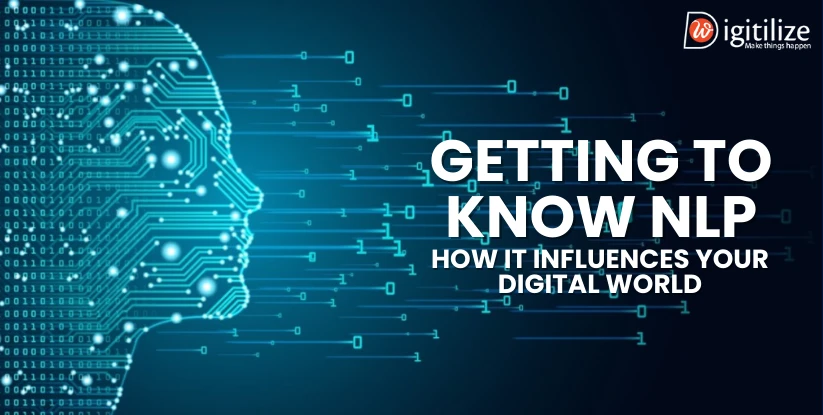Getting to Know NLP: How It Influences Your Digital World

Companies are always searching for innovative technologies to support them in their marketing campaigns. That’s why it is crucial to getting to know NLP: how it influences your digital world. The goal of the computing field known as “natural language processing,” or NLP, is to enable machines to understand human language. It is getting more and more powerful, common, and ready to completely transform the marketing industry.
Although language comes naturally to most people, computers have a very hard time understanding and using it appropriately. Spreadsheets and databases are ideal for software because of their strict, rule-bound structure, but AI wants to reboot because human languages are unpredictable, context-bound, and appear to be rule-less!
Even if NLP may not be familiar to you at this moment, it has been around for at least 30 years and has a long way to go.
Why Is NLP Important for Marketers?
 You may be thinking, “That’s nice, but what has it got to do with me?” if you work in marketing. Assuming the opinions of specialists, some of the most important and inventive uses of NLP have to do with and centre on its application in marketing.
You may be thinking, “That’s nice, but what has it got to do with me?” if you work in marketing. Assuming the opinions of specialists, some of the most important and inventive uses of NLP have to do with and centre on its application in marketing.Let us begin by going over the primary categories of NLP that you could come across frequently, keeping in mind that NLP is a scientific field that is difficult to comprehend in a 2,000-word article:
Have you ever attempted to alter an uneditable PDF? Sympathise with you if that’s the case. The technology that “aided” in the process was OCR. Speech recognition is the process of converting spoken words into data that a computer can understand. Every time you ask a query to Siri, Cortana, Echo, or Google Voice, this NLP technology is at work.
Machine translation is the process of translating text across languages. This technology powers translation programmes such as Google Translate. Producing data in a human language is known as natural language generation. This is the device you use each time Cortana or Siri responds to your query.
Sentiment analysis is the process of taking data from subjects under discussion (typically “big text”) and determining if it is good or negative, or if it can identify other things.
How NLP influence Digital market?
-
Voice Recognition and Virtual Assistants
-
Used as a sentiment analysis social listening tool
-
Use chatbots to qualify and collect leads.
-
Monitoring Competition
 Any plan involving digital marketing must include competitor analysis. To help you formulate your strategy, you must ascertain what aspects of your competitors’ business model they find successful. An AI system may scan the web for product reviews stating a feature. It flaws of a competing product by using its voice and language comprehension. Then, based on need, your company may either duplicate or steer clear of this.
They may also map out companies that are comparable to yours and compile a list of rivals that might be stealing your clients. Additionally, this may help brand affiliates convert. Artificial intelligence systems can monitor mentions of rival products made online by affiliates. After that, you can directly or indirectly contact brand affiliates for further.
Any plan involving digital marketing must include competitor analysis. To help you formulate your strategy, you must ascertain what aspects of your competitors’ business model they find successful. An AI system may scan the web for product reviews stating a feature. It flaws of a competing product by using its voice and language comprehension. Then, based on need, your company may either duplicate or steer clear of this.
They may also map out companies that are comparable to yours and compile a list of rivals that might be stealing your clients. Additionally, this may help brand affiliates convert. Artificial intelligence systems can monitor mentions of rival products made online by affiliates. After that, you can directly or indirectly contact brand affiliates for further.
-
Use NLG to produce content
-
Pattern Recognition Using Natural Language Processing
-
Tools for SEO Optimisation
-
Targeting Ads
-
Distribution of Treamline Content
Businesses may automate a variety of tasks and obtain real-time information to improve their campaigns with AI and ML. Which will streamline the dissemination of their content. Algorithms are used in programmatic advertising and real-time bidding to target certain audiences and modify bids for optimal effect. In general, NLP may assist companies in better understanding and satisfying the demands of their consumers. Enhancements like this can result in increased income, enhanced brand loyalty, retaining current consumers, and the attraction of new ones.
To be sure AI is the best choice for you, it might be helpful to investigate the limits of the technology in marketing. Spend some time discussing your plans with your team if you intend to include NLP into your marketing approach. All members of your team must comprehend the purpose of the necessary software. Know how to utilise it, and most importantly, why you have decided to incorporate these technologies. For more such content follow us on LinkedIn.
FAQ
Frequently Asked Questions
Understanding how people absorb information with the use of NLP can enable you to better craft marketing messages that are more likely to be interpreted and retained. By helping you communicate more effectively with your consumers, NLP may also help you develop stronger customer connections. Increased consumer advocacy and loyalty may result from this. Finally, NLP may assist you in controlling your own feelings and responses so that you can remain composed and professional under duress. This may be particularly helpful in high-stress scenarios like negotiations or dealing with challenging clients.
Yes, NLP can analyze customer data to create personalized marketing messages, product recommendations, and targeted advertisements tailored to individual preferences and behaviors.
NLP tools can analyze email responses, subject lines, and content to determine the most effective language, tone, and timing for email marketing campaigns, leading to higher open rates and click-through rates.
Absolutely, NLP can analyze vast amounts of textual data from social media, blogs, forums, and news articles to identify emerging consumer trends, allowing marketers to adapt their strategies accordingly.
NLP-powered chatbots and virtual assistants can handle customer inquiries, provide instant responses, and even escalate complex issues to human agents, thus enhancing the overall customer service experience.
Yes, NLP tools can monitor social media and news platforms to detect potential crises or negative sentiment surrounding a brand, enabling marketers to respond swiftly and mitigate reputational damage.

